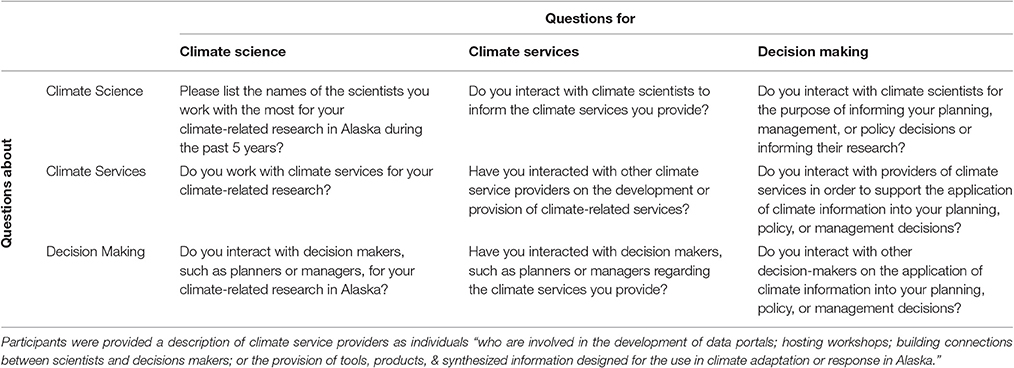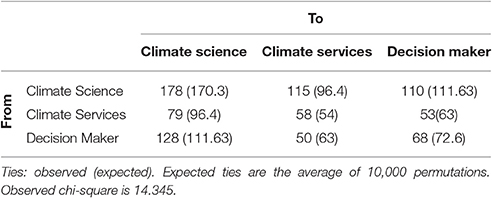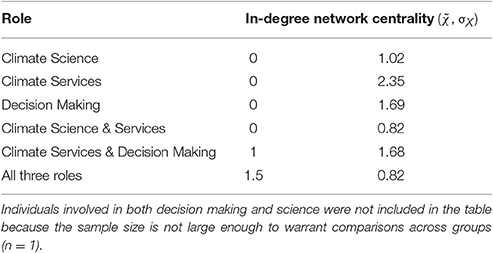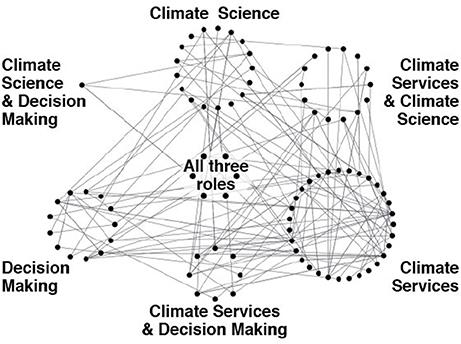- 1International Arctic Research Center, University of Alaska Fairbanks, Fairbanks, AK, United States
- 2Alaska Center for Climate Assessment and Policy, Fairbanks, AK, United States
- 3School of Natural Resources and Extension, University of Alaska Fairbanks, Fairbanks, AK, United States
- 4School of Environment and Sustainability, University of Saskatchewan, Saskatoon, SK, Canada
The gap between science and practice is widely recognized as a major concern in the production and application of decision-relevant science. This research analyzed the roles and network connections of scientists, service providers, and decision makers engaged in climate science and adaptation practice in Alaska, where rapid climate change is already apparent. Our findings identify key actors as well as significant differences in the level of bonding ties between network members who perceive similarity in their social identities, bridging ties between network members across different social groups, and control of information across roles—all of which inform recommendations for adaptive capacity and the co-production of usable knowledge. We also find that some individuals engage in multiple roles in the network suggesting that conceptualizing science policy interactions with the traditional categories of science producers and consumers oversimplifies how experts engage with climate science, services, and decision making. Our research reinforces the notion that the development and application of knowledge is a networked phenomenon and highlights the importance of centralized individuals capable of playing multiple roles in their networks for effective translation of knowledge into action.
Introduction
The gap between science and decision making, which generally refers to the conceptions that practitioners are making sub-optimal use of information and scientists are not addressing decision-relevant research issues nor producing usable information, is widely recognized as a barrier to the production and application of decision-relevant science (Kasperson and Berberian, 2011). Social scientists have identified a multitude of factors that contribute to this gap, including persistent linear notions of the production and use of information, institutional barriers to the use of information, scale mismatches, limited access to and availability of scientific reports, and lack of credibility and relevance of science (Cash et al., 2003; Rayner et al., 2005; Tribbia and Moser, 2008; Pullin et al., 2009; Dilling and Lemos, 2011). Climate science and policy provides a case-in-point for many of these issues, especially given the need for rapid mobilization of science for adaptation (Parris et al., 2016).
The architecture of actors and institutions involved in the production, mediation, and application of climate information, which we call the science-practice interface, is increasingly conceptualized as a complex, multi-level web of knowledge production and governance (Vogel et al., 2007; Kasperson and Berberian, 2011). These networks and collaborative governance systems serve several functions that support adaptive capacities, including fostering trust and social capital, mobilizing and leveraging resources, sharing information, and co-producing knowledge (Adger, 2003; Pelling and High, 2005; Armitage et al., 2011; Dow et al., 2013; Lemos et al., 2014). Models of the science-practice interface increasingly feature a wide array of actors involved in the production of climate research, the diffusion, interpretation, and framing of climate science information, the coordination of networks, and the application of climate information, and often include three core actor groups: scientists, service providers (supporting decision analysis and application, communication), and decision makers (Agrawala et al., 2001; Vogel et al., 2007; Kasperson and Berberian, 2011; Knapp and Trainor, 2015).
Network analysis in conjunction with social capital provides insight into how social structure relates to collective action (Moody and Paxton, 2009). Here we define social capital as the “norms and networks that enable people to act collectively” (Woolcock and Narayan, 2000). Szreter and Woolcock (2004) distinguish between bonding and bridging social capital. Bonding social capital refers to relations between network members who perceive similarity with regard to social identities, which is theorized to facilitate efficient communication, strengthens internal ties and upholds group norms, and fosters trust. Bridging social capital refers to relations across different social groups, which promotes access to and the creation of new ideas and information not available within a shared community (Granovetter, 1973; Burt, 2000).
Social network analysis has been used to investigate some structural dimensions of the science-practice interface, such as those between scientists and decision makers and those between service providers and decision makers, as well as how network structures are related to adaptation and social capital (Woolcock and Narayan, 2000, 226; Moody and Paxton, 2009; Crona and Parker, 2011; Owen et al., 2012; Fischer et al., 2014; Corlew et al., 2015; Cunningham et al., 2015). Fischer et al. (2014) examined bridging and bonding networks between scientists and managers, and found high levels of interaction between scientists and few connections among managers and between scientists and managers, suggesting limited opportunities for scientists to managers engage in use-inspired knowledge. Owen et al. (2012) demonstrated the central role of meteorologists in regional predictive services for communicating fire-weather information to managers. Corlew et al. (2015) assessed the structural expanse of communication networks among climate professionals across Pacific Islands region. Other research has investigated the influence of network interactions among policy makers and researchers. For example, Crona and Parker (2011) found that policy makers are more likely to utilize information from researchers when they have a greater number of contacts with boundary organization researchers and when they were more centrally embedded in the network. However, there remains limited understanding of the network connections that emerge among all three roles of scientists, service providers, and decision makers. Further, although some research suggests that “there is reasonable conceptual clarity in distinguishing between people, institutions, and processes concerned with the supply of science and those concerned with its use” (Sarewitz and Pielke, 2007, 6), several critiques suggest the mutually exclusive labels of producer and consumer may not reflect the multiple roles that individuals are engaged for the production and application of climate information (Bagozzi, 1975; Bordieu, 1977; Porter, 1985; Firat and Venkatesh, 1993; Vargo and Lusch, 2004; Welp et al., 2006; Humphreys and Grayson, 2008; Carney et al., 2009). Deepening our understanding of roles and responsibilities of individuals in such networks and how these roles contribute to the sharing of climate knowledge is critical to inform how science processes and products can most effectively be produced and disseminated to support climate-sensitive decisions (NRC, 2010b). It can also bring clarity to the selection of language and vocabulary used to describe such networks (Caputo, 1997).
To these ends this paper explores the architecture of the science-practice interface in Alaska, focusing on the interactions among individuals involved in climate science, services, and decision making. We investigate the extent that individuals are exclusively involved in climate science research, services, and decision making vs. two or more activities. We hypothesize that conceptualizing climate science policy in terms of mutually exclusive categories of producers and consumers of information oversimplifies the roles of individuals engaged in climate science, services, and decision making. We also examine how the network structure across the science-practice interface relates to adaptive capacities. We hypothesize that networking ties among climate researchers, service providers, and decision makers are facilitating the development of social capital in support of climate adaptation in Alaska.
Methods
Study Area
Alaska is on the frontline of climate change as it has experienced notable climate variability and change over the past century and these changes are predicted to continue throughout the twenty first century (SNAP, 2016). These changes have affected, and will continue to affect, environmental conditions such as permafrost thaw, sea ice extent, glacial melt, ocean acidification, and coastal erosion (Chapin et al., 2014). These changes are likely to impact multiple social, economic, and ecological aspects of regional importance, including fish and wildlife management, forestry and wildfire management, subsistence food harvest, coastal vulnerability, commercial fisheries, oil and gas development, and infrastructure planning (Chapin et al., 2014). In response to changing conditions, some agencies, organizations, and communities are beginning to develop climate adaptation plans and use climate information in decision making (Kettle and Dow, 2014).
Alaska is an ideal setting for the examination of the science-practice interface given the diverse and active set of actors and networks involved in climate research, services, and decision making (Markon et al., 2012). Although, some networks have been in place for several years, several climate networks have rapidly emerged in the past decade, such the Governor's Sub-Cabinet of Climate Change, Alaska Climate Change Executive Round Table, and Landscape Conservation Cooperatives (IAWG, 2009; State of Alaska, 2010). There is also an urgent desire and need for coordination and translation of climate information given the immediacy of impacts, sheer size of the state and paucity of long-term monitoring data sets (Alaska State Legislature, 2008; Knapp and Trainor, 2015). Creating partnerships is likewise consistently identified as a high priority to facilitate climate adaptation across Alaska (Knapp and Trainor, 2013). As such we believe the climate science network may be more developed compared to other areas with less immediate climate impacts or more politically contentious environments (Dow et al., 2013).
Sample Selection
Our analysis of the science-practice interface focuses on three core actor groups: climate scientists, service providers, and decision makers (Agrawala et al., 2001; Knapp and Trainor, 2015). For the purposes of this research, climate science encompasses a large body of scholarship on topics related to climate system science, vulnerability and adaptation, and decision support (NRC, 2010a). Climate services describes an array of activities that support climate applications and adaptation, ranging from the provision of climate data to more interactive forms of support, including those through coordination and network building, the co-development of products synthesized information, and decision support tools (Miles et al., 2006; NRC, 2009; WMO, 2011). In the United States, climate services are provided by a diverse set of actors including, Regional Climate Centers, state climatologists, National Oceanographic and Atmospheric Organization's (NOAA's) Regionally Integrated Sciences and Assessments program, cooperative extension agents, private consultants, and non-governmental organizations (NGOs). Decision-makers include planners, managers, and policy makers involved in a wide range climate-sensitive decisions for the planning and management of resources, including wildfire, water, wildlife, agriculture, and tourism (Melillo et al., 2014). We recognize our nominalist approach to defining the boundary excluded some roles, such advocates and lobbyists, who may frame, amplify, and attenuate risk messages (Kasperson et al., 1988; Laumann et al., 1989; Kasperson and Berberian, 2011). As such, this approach focuses on a network connections related to climate vulnerability, rather than a broader set of networks related to other socio-economic conditions and developments.
A list of key actors involved in climate science, services, and decision making in Alaska between 2009 and 2013 (n = 738) was created based on 3 searches conducted in October 2013. First, we selected the first author from references in the Alaska Technical Regional Report for the National Climate Assessment (Markon et al., 2012) and searched for citations that focused on Alaska and discussed themes related to climate science, impacts, and adaptation. This step identified 87 individuals involved in climate research in Alaska. Second, we identified 561 scientists, service providers, and decision makers who attended conferences and workshops related to climate in Alaska via an internet search. Finally, we reviewed agency and organization websites to identify climate service providers (n = 69). Internet searches were based on the keywords: Alaska, climate services, decision support, tools, climate coordinator, educator, and network. For sample position descriptions of each of these roles, see Table 1. Participants were randomly selected from the sample population (n = 738) for interviews, which were conducted from November 2013 to April 2014. This procedure was used because it was not possible to sample the entire population engaged in climate science, decision making, and services across Alaska—a common limitation of social network analysis, given the difficulty in compiling a comprehensive list of actors and limited resources to survey the entire population (Prell, 2012).
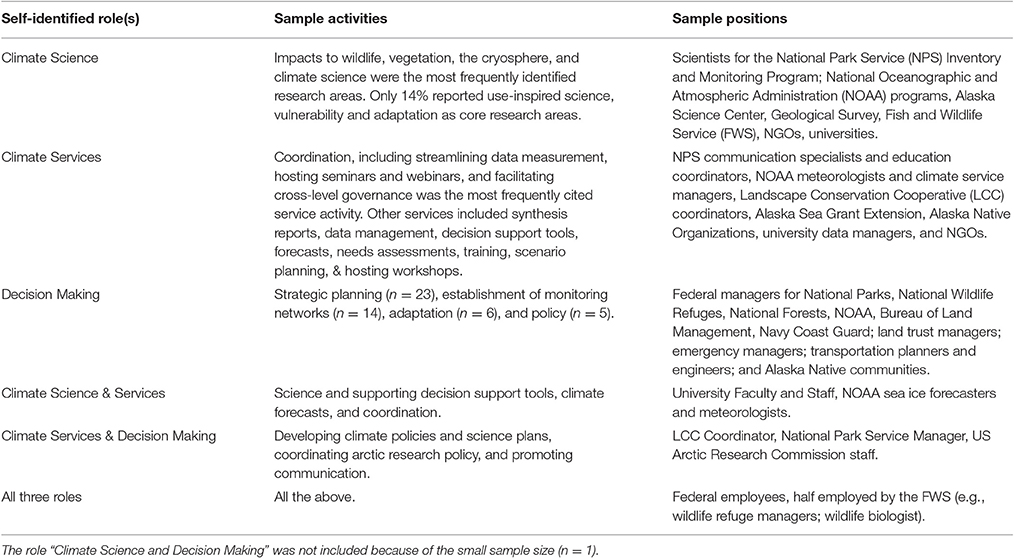
Table 1. Participant engagement in Climate Science, Climate Services, and Decision-making in Alaska, including sample activities and prominent positions.
Interviews (n = 126, 45% response rate) focused on understanding participant involvement in climate science, services, and decision making, and network ties. Role classification, that is, where people fit into our framework of scientist, service provider, and decision-maker, was based on a self-assessment, where participants indicated the total percent of their total job responsibilities divided among the three roles. Individuals were classified as having multiple roles if they identified at least 20% of their responsibilities in two or more of the role classes. A 20% threshold emerged from interview data; the majority of participants who identified a role as <20% of their job did not discuss significant activities associated with that role. Interviews were recorded, transcribed, and coded for themes related to climate science, services, and decision making activities and bonding and bridging ties. The interview protocol was pilot tested with eight individuals. Participants identified network ties without the assistance of checklists as all network members were not known. Three sets of name generator questions were used to identify collaboration network ties across the three roles (Table 2). The number of name generator sets used depended on the number of roles in which each participant was engaged. To reduce stakeholder fatigue, the maximum number of ties was capped at 10 per question and ties were limited to the past 5 years (Merluzzi and Burt, 2013).
Data Processing and Analysis
Social network analysis was used to examine the structure of the science-practice interface for both actor- and network-level data (Miles et al., 2006; NRC, 2009). The actor-level analysis investigated the immediate ties surrounding each of the 126 individual networks to assess the level of bonding and bridging ties (Szreter and Woolcock, 2004). The network-level analysis focused on the structure of the entire network and the position of individual networks relative to the entire network. Data for the network-level statistics only included ties to those who were also interviewed (network ties to individuals not interviewed were not included in the network-level analysis).
Data processing and analysis began with data cleaning, including verifying spelling of the identified network ties (n = 1575). Duplicate ties were collapsed for the network-level data analysis, in cases where an ego identified the same alter across multiple networking questions. Differences in the expected frequency of network ties across and within each of the mutually exclusive roles were investigated based on interpretation of a block model permutation test using UCINET. We also run a chi-squared test to investigate differences in network ties, given the limitations of incomplete data and our sampling procedures for analyzing network-level data (Znidarsic et al., 2012). We acknowledge that chi-square tests are more likely to provide false positive claims of significance when assumptions of independence are not met (Kramer and Schmidhammer, 1992).
Network connectedness across the science-practice interface was assessed based on in-degree network centrality (popularity, prestige), or on the number of ties received by an individual by other actors. Significant differences in network centrality were assessed based on interpretation of Kruskall-Wallis and Mann Whitney U tests. We recognize our sampling procedures generated incomplete network data that introduces measurement error (Galaskiewicz, 1991; Borgatti et al., 2006). This shortcoming, which emerges from difficulties in defining the network boundary, non-interview or non-response from participants, and limited resources to collect network data, is a longstanding challenge for social network analysis studies. Indeed, statisticians are exploring ways to modeling social network when the population is not fully known (David and Snijders, 2002). Research on the influence of sampling procedures on the stability of centrality measures suggest there is a positive linear relationship between measurement error and the proportion of sampled data (Galaskiewicz, 1991; Borgatti et al., 2006). Other research finds that in-degree is among the most robust measures for sampled data (Costenbader and Valente, 2003). As such, it is possible to utilize some aspects of social network analysis techniques when all members of a community are not interviewed (Costenbader and Valente, 2003, 305).
Results
Based on the analysis of 126 semi-structured interviews, we identified the extent that participants engage in climate science, services, and application of climate information as discrete activities and conducted a social network analysis of interactions across the science-practice interface. We found that participants reported engagement in several dimensions of climate-related science, services, and decision making. Although the majority of participants engaged in discrete roles, 30% of interviewees engaged in at least two roles and 5% identified engagement in all three roles (Figure 1). Of the individuals involved in at least two roles, the majority were involved in research and services or decision making and services. Few individuals are only involved in research and decision making (1%).
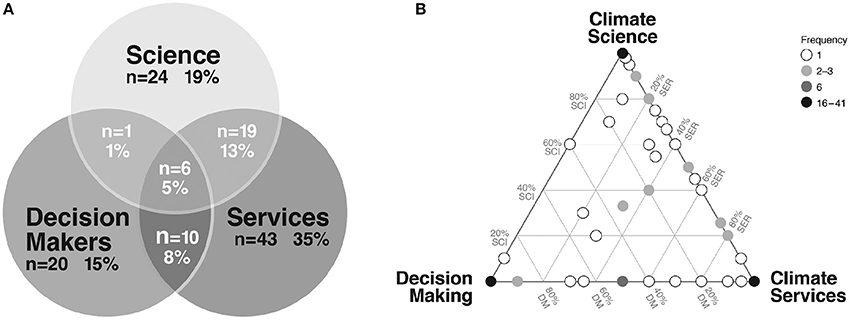
Figure 1. Self-reported roles divided into our framework of science, services, and decision making. (A) Venn diagram of overlap among roles. Overlap in roles required a minimum of 20% (see Section Methods). (B) Ternary plot of self-reported roles. Circles located in the corners of the triangle represent individuals with discrete roles. Circles located on the outside edges represent individuals involved in two roles. Individuals self-reporting as having three roles are located in the interior of the triangle.
A structural analysis of the climate science practice-interface revealed several patterns, including, similarities and differences in the number of actor-level connections, types and level of bonding and bridging ties, and centrality of roles. For actor-level networks (i.e., immediate ties for each of the 126 interviews), the overall size of individual networks was similar across each mutually exclusive role, with climate service providers self-identifying slightly larger networks than scientists and decision makers ( = 7, 6, 5.5 ties, respectively). For those involved in multiple roles, individuals engaged in all three roles held the most network connections ( = 16) and individuals engaged in both research and services held slightly larger networks than individuals involved in services and decision making ( = 10 and 14, respectively).
Interpretation of the block model permutation test revealed there were no significant differences in the level of interaction across and within roles (Table 3). Such findings are surprising given the significant differences in science-policy interactions in other sectors and regions (McPherson et al., 2001; Fischer et al., 2014). In contrast, analysis of the chi-square test revealed some significant differences in the level of interaction among scientists, service providers, and decision makers (Figure 2). We report on the analysis of the chi-square test below, as we believe missing (sampled) data from the permutation test are more likely to account for the detected distribution of ties, rather than an actual presence of no significant differences (Znidarsic et al., 2012).
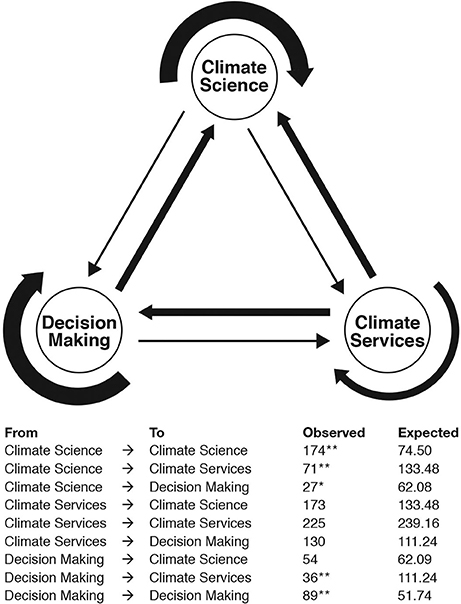
Figure 2. Interactions among those involved in climate science, climate services, and decision making. Significant differences were detected through interpretation of a chi-square statistical test (df = 8; *p ≤ 0.05; **p ≤ 0.01). The thinnest and thickest lines represent significantly under- and over-predicted, respectively. Regular lines represent no significant difference between observed and expected. Individuals with multiple roles were not included in the figure as interviewees could only specify alters as having mutually exclusive roles.
Bonding ties within individual roles were significantly greater than expected for both scientists and decision makers (p ≤ 0.01) than would be expected in a random network. However, not all decision makers and service providers held high levels of bonding ties. Thirty percent of all decision makers and twenty percent of all service providers held one or fewer bonding ties. At the same time, there were significant differences in bridging ties across each of the mutually exclusive roles, especially for scientists and decision makers. Bridging ties from both scientists and decision makers to climate service providers were significantly less than expected (p ≤ 0.01). Similarly, bridging ties from scientists to decision makers were also significantly less than expected (p ≤ 0.01). Bonding ties among service providers and bridging ties from service providers were not significantly different.
The high level of bonding ties within each role is consistent with the concept of homophily, where individuals tend to network more frequently with those whom are more similar (McPherson et al., 2001). The high level of bonding among scientists and low level of bridging ties to decision makers and service providers from scientists, is likely related to traditional norms whereby scientists are rewarded for intellectual and scholarly contributions, rather than research that engages decision makers and climate service providers (Walters, 1997; Lemos et al., 2014). The level of bridging ties between scientists with decision makers is also likely related to the researcher's desired role in science policy processes (Pielke, 2007; Spruijt et al., 2016). For example, individuals who perceive their role as a researcher as either a “pure” or “humble” scientist are less likely to be also engaged in decision making and more likely to have fewer ties to decision makers, compared to scientists who are more engaged in the regulatory process. The high level of bonding ties among managers could be related to perceived risk and the immediacy of the challenge in Alaska, as social network analysis research in other areas of the US with less drastic rates of climate change have found bonding ties among managers are significantly less (p ≤ 0.01) than what would be expected in a random network (Fischer et al., 2014). Of the limited number of bridging ties between scientists and decision makers, the majority of interactions were described as the transfer of climate information, rather than coproducing research agendas (Cash et al., 2006). The higher level of bridging ties among service providers reflects their central focus on connecting science and decision making. Such coordinating efforts were especially important in remote locations across Alaska for connecting researchers to tribal staff and negotiating complicated political arrangements. The availability of remote forms of engagement likely enhanced opportunities for developing bonding and bridging ties across large geographical regions (e.g., Kettle and Trainor, 2015).
Although, there were no significant differences in network centrality, individual climate service providers were among those with the highest levels of connection (Table 4). Six of the individuals with “top 10” rankings in centrality were climate service providers. These individuals included employees at NOAA (regional coordinator, climate science and service managers, division chief), NGOs (environmental managers), and the LCCs (science coordinator). The high level of network centrality among service providers reflects focus on connecting science and decision making and a relatively high level of bridging ties to scientists and decision makers. The high proportion of federal employees serving as the most central climate service providers in the network, highlights the federal governments lead in the coordination of climate responses in Alaska (NRC, 2010b).
Discussion
Findings that some individuals engage in discrete roles of climate science, services, and decision making, and that others engage in multiple roles suggests conceptualizing the science policy interface in terms of mutually exclusive categories of producers and consumers (users) of information oversimplifies individual involvement (Bagozzi, 1975; Bordieu, 1977; Porter, 1985; Firat and Venkatesh, 1993; Vargo and Lusch, 2004; Welp et al., 2006; Carney et al., 2009). Additional research is needed to understand motivations for individuals engaging in multiple roles, role strain associated with responding to the needs of different network segments (Marks and MacDermid, 1996), and how the network functions of those engaged in multiple roles is linked to climate adaptation and adaptive capacity. Additional research can also investigate the extent that engagement in multiple roles varies across different geographic regions, decision contexts, and timeframes.
Our findings confirm that the interface between science and practice is characterized as a complex web of interactions, rather than a simple pipeline, bridge, or superhighway (Kasperson and Berberian, 2011; Figure 3). The significant differences in expected frequency of network ties across the science-practice interface, than what would be expected under conditions of a random network, have implications for adaptive capacity and the success of knowledge to action networks. The significantly lower number of bridging ties (p ≤ 0.05) from scientists and decision makers to the other roles may limit opportunities for scientists to pursue research agendas that can fulfill management needs, and similarly for decision makers to use science to inform their decision making processes. Indeed, the limited bridging between scientists and decision makers may contribute to the persistent unrealized research needs identified by stakeholders across Alaska (Knapp and Trainor, 2015).
At the same time, the relatively high level of bonding ties within each of the independent roles underscores significant opportunity for effective communication, coordination, and the maintenance of trust because social cohesion enhances opportunities for the sharing of tacit knowledge and transferring acquired explicit knowledge into practice (Borgatti et al., 1998; Burt, 2004; Oh et al., 2004). Several scientists discussed how connections to scientists from different disciplines fostered data sharing and the exchange of technical expertise. Similarly, formal networks among decision makers promoted information sharing, coordination, and securing funds to support climate adaptation (IAWG, 2009). Finally, formalized partnerships and networks among service providers also enabled the leveraging of specialized knowledge to support the development of knowledge-to-action-networks and decision support tools more efficiently (e.g., Kettle and Trainor, 2015). However, the relatively high number of service providers and decision makers with zero bonding ties highlights potential barriers to effective communication and coordination across the network (although the average number of bonding ties was high, several individuals held zero connections). For example, decision makers wanting to learn from the experiences of other communities adapting to climate change may not have network ties that enable the exchange of information and experience. We already know, for example, that community decision makers in rural Alaska are limited in the capacity they have available to pursue these activities (Loring et al., 2016). At the same time, the high level of bonding ties among decision makers and scientists may pose network constraints, such as reduced social energy to create bridging ties, the suppression of new ideas, reduced willingness to seek new information on climate impacts, and reduced resiliency to abrupt change (Newig et al., 2010; Smith et al., 2012). Additional insights into the network structure, functions, and potential barriers to communication may be revealed via disaggregation of individual roles. For example, the delineation of decision makers into different sectors may reveal differences bonding social capital, network centralization, and bridging social capital across sectors. The disaggregation of the climate science role into climate system scientists and climate impact scientists may also reveal potential gaps that impede the development and effectiveness of climate services.
We acknowledge that network structures are both dynamic and related to social processes and deliberate action. This study provides a baseline to assess how networks change and evaluate how deliberative knowledge co-production can address the persistent gap between science and practice. Such longitudinal evaluations can be used by service providers for program evaluation to measure and assess the processes and outcomes of knowledge co-production using the methods of social network analysis. This includes the measurement of immediate ties to assess the level and quality of scientist-stakeholder collaborations (Lemos et al., 2012; Ferguson et al., 2016) and network-level measures that can evaluate changes in the extent that boundary organizations are connecting otherwise disconnected actors or are efficiently using the network to relay messages. Critical to such evaluations are the recognition that some individuals engage in multiple roles and the development and application of knowledge as a networked phenomenon.
Ethics Statement
This research was carried out in accordance with Belmont Report to ensure the rights and welfare of research participants. All subjects provided oral informed consent. The protocol was approved by the University of Alaska Fairbanks Institutional Review Board.
Author Contributions
NK, ST, and PL jointly designed the research protocol. NK took the lead on data collection, analysis, and writing. All authors discussed the findings and implications, and commended on the manuscript at every stage.
Funding
This research was supported by the National Oceanic and Atmospheric Administration's Climate Program Office (Award NA11OAR4310141) and the Alaska Climate Science Center (funded by Cooperative Agreement G10AC00588 from the U.S. Geological Survey). Its contents are solely the responsibility of the authors and do not necessarily represent the official views of neither NOAA nor the USGS.
Conflict of Interest Statement
The authors declare that the research was conducted in the absence of any commercial or financial relationships that could be construed as a potential conflict of interest.
Acknowledgments
The authors wish to thank all the participants who contributed to this study, including their time and insights.
References
Adger, W. N. (2003). Social capital, collective action and adaptation to climate change. Econ. Geogr. 79, 387–404. doi: 10.1111/j.1944-8287.2003.tb00220.x
Agrawala, S., Broad, K., and Guston, D. H. (2001). Integrating climate forecasts and societal decision making: challenges to an emergent boundary organization. Sci. Technol. Hum. Values 26, 454–477. doi: 10.1177/016224390102600404
Armitage, D., Berkes, F., Dale, A., Kocho-Schellenberg, E., and Patton, E. (2011). Co-management and the co-production of knowledge: learning to adapt in Canada's Arctic. Glob. Environ. Change 21, 995–1004. doi: 10.1016/j.gloenvcha.2011.04.006
Borgatti, S. P., Carley, K. M., and Krackhardt, D. (2006). On the robustness of centrality measures under conditions of imperfect data. Soc. Netw. 28, 124–136. doi: 10.1016/j.socnet.2005.05.001
Borgatti, S. P., Jones, C., and Everett, M. G. (1998). Network measures of social capital. Connections 2, 27–36.
Burt, R. (2000). The network structure of social capital. Res. Organ. Behav. 22, 345–423. doi: 10.1016/S0191-3085(00)22009-1
Burt, R. S. (2004). Structural holes and good ideas. Am. J. Sociol. 110, 349–399. doi: 10.1086/421787
Caputo, J. D. (1997). Deconstruction in a Nutshell: a Conversation with Jacques Derrida. New York, NY: Fordham University Press.
Carney, S., Whitmarsh, L., Nicholson-Cole, S., and Shackley, S. (2009). A Dynamic Typology of Stakeholder Engagement within Climate Change Research. Norwich: Tyndall Centre for Climate Change Research.
Cash, D. W., Borck, J. C., and Patt, A. G. (2006). Countering the loading-dock approach to linking science and decision making: comparative analysis of the El Niño/Southern Oscillation (ENSO) forecasting systems. Sci. Technol. Hum. Values 31, 465–494. doi: 10.1177/0162243906287547
Cash, D. W., Clark, W. C., Alcock, F., Dickson, N. M., Eckley, N., Mitchell, R. B., et al. (2003). Knowledge systems for sustainable development. Proc. Natl. Acad. Sci. U.S.A. 100, 8086–8091. doi: 10.1073/pnas.1231332100
Chapin, F. S. II., Trainor, S. F., Cochran, P., Huntington, H., Markon, C., Serreze, M., et al. (2014). “Chapter 22: Alaska. Climate change impacts in the United States,” in The Third National Climate Assessment, eds J. M. Melillo, T. Richmond, and G. W. Yohe (Washington, DC: U.S. Global Change Research Program), 514–536.
Corlew, L. K., Kenner, V., Finucane, M., Brewington, L., and Nunn-Crichton, R. (2015). Using social network analysis to assess communications and develop networking tools among climate change professionals across the Pacific Islands region. Psychol. Interv. 24, 133–146. doi: 10.1016/j.psi.2015.07.004
Costenbader, E., and Valente, T. W. (2003). The stability of centrality measures when networks are sampled. Soc. Netw. 25, 283–307. doi: 10.1016/S0378-8733(03)00012-1
Crona, B. I., and Parker, J. N. (2011). Network determinants of knowledge utilization: preliminary lessons from a boundary organization. Sci. Commun. 33, 448–471. doi: 10.1177/1075547011408116
Cunningham, R., Cvitanovic, C., Measham, T., Jacobs, B., Dowd, A., and Harman, B. (2015). Engaging communities in climate adaptation: the potential of social networks. Clim. Policy 16, 894–908. doi: 10.1080/14693062.2015.1052955
David, B., and Snijders, T. (2002). Estimating the size of the homeless population in Budapest, Hungary. Qual. Quant. 36, 291–303. doi: 10.1023/A:1016080606287
Dilling, L., and Lemos, M. C. (2011). Creating usable science: opportunities and constraints for climate knowledge use and their implications for science policy. Glob. Environ. Change 21, 680–689. doi: 10.1016/j.gloenvcha.2010.11.006
Dow, K., Haywood, B., Kettle, N., and Lackstrom, K. (2013). The role of ad hoc networks in supporting climate change adaptation: a case study from the Southeastern United States. Reg. Environ. Change 13, 1235–1244. doi: 10.1007/s10113-013-0440-8
Ferguson, D. B., Finucane, M. L., Keener, V. W., and Owen, G. (2016). “Evaluation to advance science policy: lessons from Pacific RISA and CLIMAS,” in Climate in Context, eds A. Parris, G. Garfin, K. Dow, R. Meyer, and S. Close (West Sussex: Wiley and Sons), 215–233.
Firat, A. F., and Venkatesh, A. (1993). Postmodernity: the age of marketing. Int. J. Res. Market. 10, 227–249. doi: 10.1016/0167-.8116(93)90009-N
Fischer, A. P., Vance-Borland, K., Burnett, K. M., Hummel, S., Creighton, J. H., Jasny, L., et al. (2014). Does the social capital in networks of “fish and fire” scientists and managers suggest learning? Soc. Natl. Resour. 27, 671–688. doi: 10.1080/08941920.2014.901463
Galaskiewicz, J. (1991). Estimating point centrality using different network sampling techniques. Soc. Netw. 13, 347–386. doi: 10.1016/0378-8733(91)90002-B
Granovetter, M. S. (1973). The strength of weak ties. Am. J. Sociol. 78, 1360–1380. doi: 10.1086/225469
Humphreys, A., and Grayson, K. (2008). The intersecting roles of consumer and producer: a critical perspective on co-production, co-creation and prosumption. Sociol. Compass 2, 963–980. doi: 10.1111/j.1751-9020.2008.00112.x
Kasperson, R. E., and Berberian, M. (eds.). (2011). Integrating Science and Policy: Vulnerability and Resilience in Global Environmental Change. New York, NY: Earthscan.
Kasperson, R. E., Renn, O., Slovic, P., Brown, H. S., Emel, J., Ratick, S., et al. (1988). The social amplification of risk. Risk Anal. 8, 177–187. doi: 10.1111/j.1539-6924.1988.tb01168.x
Kettle, N. P., and Dow, K. (2014). Cross-scale differences and similarities in coastal climate change adaptation planning. Environ. Sci. Policy 44, 279–290. doi: 10.1016/j.envsci.2014.08.013
Kettle, N. P., and Trainor, S. F. (2015). The role of remote engagement in supporting boundary chain networks across Alaska. Clim. Risk Manag. 9, 6–19. doi: 10.1016/j.crm.2015.06.006
Knapp, C. N., and Trainor, S. F. (2013). Adapting science to a warming world. Glob. Environ. Change 23, 1296–1306. doi: 10.1016/j.gloenvcha.2013.07.007
Knapp, C. N., and Trainor, S. (2015). Alaskan stakeholder-defined research needs in the context of climate change. Polar Geogr. 38, 42–69. doi: 10.1080/1088937X.2014.999844
Kramer, M., and Schmidhammer, J. (1992). The chi-squared statistic in ethnology: use and misuse. Anim. Behav. 44, 833–841. doi: 10.1016/S0003-3472(05)80579-2
Laumann, E. O., Marsden, P., and Prensky, D. (1989). “The boundary specification problem in network analysis,” in Research Methods in Social Network Analysis, eds L. C. Freeman, D. White, and A. K. Romney (Fairfax, VA: George Mason University), 61–89.
Lemos, M. C., Kirchhoff, C. J., Kalafatis, S. E., Scavia, D., and Rood, R. B. (2014). Moving climate information off the shelf: boundary chains and the role of RISAs as adaptive organizations. Weather Clim. Soc. 6, 273–285. doi: 10.1175/WCAS-D-13-00044.1
Lemos, M. C., Kirchhoff, C. J., and Ramprasad, V. (2012). Narrowing the climate information usability gap. Nat. Clim. Change 2, 789–794. doi: 10.1038/nclimate1614
Loring, P. A., Gerlach, S. C., and Penn, H. J. (2016). “Community Work” in a climate of adaptation: responding to change in Rural Alaska. Hum. Ecol. 44, 119–128. doi: 10.1007/s10745-015-9800-y
Markon, C. J., Trainor, S., and Chapin, F. S. I. (2012). The United States National Climate Assessment - Alaska Technical Regional Report.
Marks, S. R., and MacDermid, S. M. (1996). Multiple roles and the self: a theory of role balance. J. Marriage Fam. 58, 417–432. doi: 10.2307/353506
McPherson, M., Smith-Lovin, L., and Cook, J. M. (2001). Birds of a feather: homophily in social networks. Annu. Rev. Sociol. 27, 415–444. doi: 10.1146/annurev.soc.27.1.415
Melillo, J. M., Richmond, T. C., and Yohe, G. W. (2014). Climate Change Impacts in the United States: The Third National Climate Assessment. Washington DC: USGCRP, 841
Merluzzi, J., and Burt, R. (2013). How many names are enough? Identifying network effects with the least set of listed contacts. Soc. Netw. 35, 331–337. doi: 10.1016/j.socnet.2013.03.004
Miles, E. L., Snover, A. K., Whitely Binder, L. C., Sarachik, E. S., Mote, P. W., and Mantua, N. (2006). An approach to designing a national climate service. Proc. Natl. Acad. Sci. 103, 19616–19623. doi: 10.1073/pnas.0609090103
Moody, J., and Paxton, P. (2009). Building bridges: linking social capital and social networks to improve theory and research. Am. Behav. Sci. 52, 1491–1506. doi: 10.1177/0002764209331523
Newig, J., Gunther, D., and Pahl-Wostl, C. (2010). Synapses in the network: learning in governance networks in the context of environmental management. Ecol. Soc. 15:24. doi: 10.5751/ES-03713-150424
NRC (2010a). Advancing the Science of Climate Change. Washington, DC: The National Academy of Sciences, 528.
NRC (2010b). Informing an Effective Response to Climate Change. Washington, DC: National Academies Press.
Oh, H., Chung, M. H., and Labianca, G. (2004). Social capital and group effectiveness: the role of informal socializing ties. Acad. Manag. 47, 860–875. doi: 10.2307/20159627
Owen, G., McLeod, J. D., Kolden, C. A., Ferguson, D. B., and Brown, T. J. (2012). Wildfire management and forecasting fire potential: the role of climate information and social networks in the southwest United States. Weather Clim. Soc. 4, 90–102. doi: 10.1175/WCAS-D-11-00038.1
Parris, A., Garfin, G. M., Dow, K., Meyer, R., and Close, S. (2016). Climate in Context. West Sussex: Wiley & Sons.
Pelling, M., and High, C. (2005). Understanding adaptation: what can social capital offer assessments of adaptive capacity? Glob. Environ. Change 15, 308–319. doi: 10.1016/j.gloenvcha.2005.02.001
Pielke, R. A. Jr. (2007). The Honest Broker: Making Sence of Science in Policy and Politics. Cambridge: Cambridge University Press.
Pullin, A. S., Knight, T. M., and Watkinson, A. R. (2009). Unpacking environmental policy questions to construct an evidence-based framework. J. Appl. Ecol. 46, 970–975. doi: 10.1111/j.1365-2664.2009.01704.x
Rayner, S., Lach, D., and Ingram, H. M. (2005). Weather forecasts are for wimps: why water resource managers do not use climate forecasts. Clim. Change 69, 197–227. doi: 10.1007/s10584-005-3148-z
Sarewitz, D., and Pielke, R. J. (2007). The neglected heart of science policy: reconciling supply of and demand for science. Environ. Sci. Policy 10, 5–16. doi: 10.1016/j.envsci.2006.10.001
Smith, J. W., Anderson, D. H., and Moore, R. L. (2012). Social capital, place meanings, and perceived resilience to climate change*. Rural Sociol. 77, 380–407. doi: 10.1111/j.1549-0831.2012.00082.x
Spruijt, P., Knol, A. B., Petersen, A. C., and Lebret, E. (2016). Differences in views of experts about their role in particulate matter policy evidence: empirical evidence from an international expert consultation. Environ. Sci. Policy 59, 44–52. doi: 10.1016/j.envsci.2016.02.003
State of Alaska (2010). Alaska's Climate Change Strategy: Addressing Impacts in Alaska. Final Report Submitted by the Adaptation Advisory Group to the Alaska Climate Change Sub-Cabinet, 94
Szreter, S., and Woolcock, M. (2004). Health by association? Social capital, social theory, and the political economy of public health. Int. J. Epidemiol. 33, 650–667. doi: 10.1093/ije/dyh013
Tribbia, J., and Moser, S. C. (2008). More than information: what coastal managers need to plan for climate change. Environ. Sci. Policy 11, 315–328. doi: 10.1016/j.envsci.2008.01.003
Vargo, S. L., and Lusch, R. F. (2004). Evolving to a New Dominant Logic for Marketing. J. Mark. 68, 1–17. doi: 10.1509/jmkg.68.1.1.24036
Vogel, C., Moser, S. C., Kasperson, R. E., and Dabelko, G. D. (2007). Linking vulnerability, adaptation, and resilience science to practice: pathways, players, and partnerships. Glob. Environ. Change 17, 349–364. doi: 10.1016/j.gloenvcha.2007.05.002
Walters, C. (1997). Challenges in adaptive management of riparian and coastal ecosystems. Conserv. Ecol. 1, 1. doi: 10.5751/ES-00026-010201
Welp, M., de la Vega-Leinert, A., Stoll-Kleemann, S., and Jaeger, C. C. (2006). Science-based stakeholder dialouges: theories and tools. Glob. Environ. Change 16, 170–181. doi: 10.1016/j.gloenvcha.2005.12.002
WMO (2011). Climate Knowledge for Action: A Global Framework for Current Climate Services - Empowering the Most Vulnerable. World Meterological Organization, 240
Woolcock, M., and Narayan, D. (2000). Social capital: implications for development theory, research, and policy. World Bank Res. Obs. 15, 225–249. doi: 10.1093/wbro/15.2.225
Keywords: science-practice interface, networks, climate adaptation, social network analysis, Alaska
Citation: Kettle NP, Trainor SF and Loring PA (2017) Conceptualizing the Science-Practice Interface: Lessons from a Collaborative Network on the Front-Line of Climate Change. Front. Environ. Sci. 5:33. doi: 10.3389/fenvs.2017.00033
Received: 30 September 2016; Accepted: 02 June 2017;
Published: 22 June 2017.
Edited by:
Giuseppe Feola, University of Reading, United KingdomReviewed by:
Rob Swart, Wageningen Environmental Research (Alterra), NetherlandsNicola Lettieri, National Institute for Public Policy Analysis, Italy
Copyright © 2017 Kettle, Trainor and Loring. This is an open-access article distributed under the terms of the Creative Commons Attribution License (CC BY). The use, distribution or reproduction in other forums is permitted, provided the original author(s) or licensor are credited and that the original publication in this journal is cited, in accordance with accepted academic practice. No use, distribution or reproduction is permitted which does not comply with these terms.
*Correspondence: Nathan P. Kettle, bmtldHRsZUBhbGFza2EuZWR1
 Nathan P. Kettle
Nathan P. Kettle Sarah F. Trainor2,3
Sarah F. Trainor2,3 Philip A. Loring
Philip A. Loring